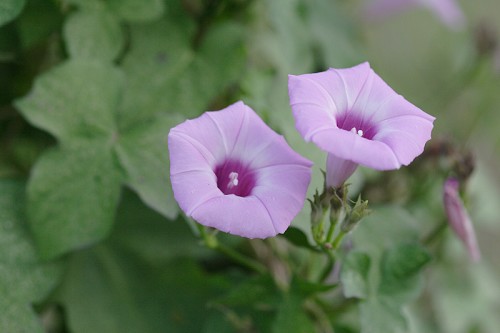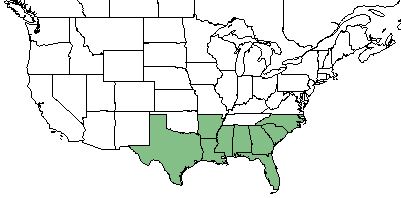Difference between revisions of "Ipomoea cordatotriloba"
Emmazeitler (talk | contribs) (→Taxonomic Notes) |
Emmazeitler (talk | contribs) (→Distribution) |
||
| Line 28: | Line 28: | ||
==Distribution== | ==Distribution== | ||
| − | + | Its range extends from southeast North Carolina to southern Florida, then west to east Texas and Arizona.<ref name="weakley">Weakley, A.S. 2015. Flora of the southern and mid-atlantic states. Working Draft of 21 May 2015. University of North Carolina at Chapel Hill, Chapel Hill, North Carolina.</ref> | |
==Ecology== | ==Ecology== | ||
Revision as of 15:00, 17 September 2020
Common name: tievine [1], coastal morning-glory [2]
| Ipomoea cordatotriloba | |
|---|---|

| |
| Photo by the Southeastern Flora Database | |
| Scientific classification | |
| Kingdom: | Plantae |
| Division: | Magnoliophyta - Flowering plants |
| Class: | Magnoliopsida - Dicots |
| Order: | Solanales |
| Family: | Convolvulaceae |
| Genus: | Ipomoea |
| Species: | I. cordatotriloba |
| Binomial name | |
| Ipomoea cordatotriloba Dennst. | |

| |
| Natural range of Ipomoea cordatotriloba from USDA NRCS Plants Database. | |
Contents
Taxonomic Notes
Synonyms: Ipomoea trichocarpa Elliott; I. trifida.[3]
Varieties: Ipomoea cordatotriloba Dennstedt var. cordatotriloba.[3]
Description
I. cordatotriloba is a perennial forb/herb/vine of the Convolvulaceae family native to North America. [1]
Distribution
Its range extends from southeast North Carolina to southern Florida, then west to east Texas and Arizona.[3]
Ecology
Habitat
I. cordatotriloba is found in dunes, sandy areas on barrier islands, and other sandy habitats. [2] Specimens have been collected from sand of roadside depression, sand floodplain, and margin of thin woods. [4]
Phenology
I. cordatotriloba has been observed to flower in June, July, and September. [5]
Fire ecology
It has been observed flowering in recently burned wetland. [6]
Use by animals
Butterflies are commonly found in proximity to I. cordatotriloba, skippers in particular. [6]
Conservation and Management
I. cordatotriloba is listed as a noxious weed by the Arizona Department of Agriculture Plant Services Division and the Arkansas State Plant Board. [1]
Cultivation and restoration
Photo Gallery
References and notes
- ↑ 1.0 1.1 1.2 USDA Plant Database https://plants.usda.gov/core/profile?symbol=IPCOC2
- ↑ 2.0 2.1 Weakley, A. S. (2015). Flora of the Southern and Mid-Atlantic States. Chapel Hill, NC, University of North Carolina Herbarium.
- ↑ 3.0 3.1 3.2 Weakley, A.S. 2015. Flora of the southern and mid-atlantic states. Working Draft of 21 May 2015. University of North Carolina at Chapel Hill, Chapel Hill, North Carolina.
- ↑ URL: http://herbarium.bio.fsu.edu. Last accessed: June 2018. Collectors: R. Komarek, R.k. Godfrey, Andre Clewell, Pat Ferral, John Nelson, Loran C. Anderson, J.M. Kane. States and counties: Florida (Leon, Liberty, Jefferson, Franklin) Georgia (Thomas) South Carolina (Georgetown)
- ↑ Nelson, G. PanFlora: Plant data for the eastern United States with emphasis on the Southeastern Coastal Plains, Florida, and the Florida Panhandle. www.gilnelson.com/PanFlora/ Accessed: 22 MAY 2018
- ↑ 6.0 6.1 Observation by Edwin Bridges in Big Cypress National Preserve, Collier COunty, Septmber 30, 2009, posted to Florida Flora and Ecosystematics Facebook Group January 2017. Cite error: Invalid
<ref>tag; name "FFE" defined multiple times with different content